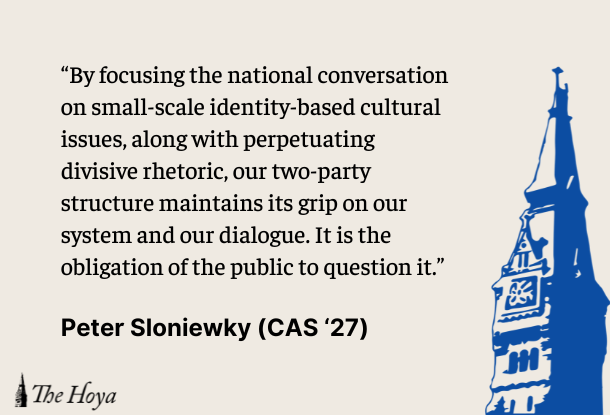It’s clear that the voting public does not win from political polarization.
Although those at the extremes of the Democratic and Republican parties are often seen challenging partisan leadership to broad popular disdain, their efforts are not all misguided. By focusing the national conversation on small-scale identity-based cultural issues, along with perpetuating divisive rhetoric, our two-party structure maintains its grip on our system and our dialogue. It is the obligation of the public to question it.
It is the civic obligation of the American public, and therefore the students of Georgetown University, to develop a fully informed, participatory democracy. This starts with reconsidering our partisan structures.
The national dialogue has simultaneously become more focused on controversial social issues and increasingly overcome with inflammatory rhetoric. As politicians and pundits dehumanize so-called opponents and erode our norms of governance (such as extended elections for Speaker of the House), Americans have become desensitized to partisan conflict, dismantling our popular understanding of democratic ideals.
A national dialogue focused on partisan warfare also minimizes the public’s ability to question institutional politicians and policy agendas that support powerful individuals. Because of the pressing nature of extremist rhetoric and partisan warfare, equitable policies such as proposals for higher taxes on billionaires and corporations or expanded social welfare programs are mostly restricted to the fringes of our political consciousness, outside the scope of socially acceptable and considered ideas.
Democrats and Republicans alike focus on a constant perceived threat from the other side of the aisle, leading both parties to push proposals like Medicare for All away from serious consideration and public discourse regardless of their broad popular support.
Concerningly, the existing two-party system prevents the enactment of potential solutions to these problems.
Fear of the spoiler effect, the phenomenon by which third-party candidates draw votes away from the more similar mainstream candidate, prevents many from voting for candidates they may more specifically align with. This keeps smaller-scale political movements from gaining traction and has prevented the rise of third-party candidates who have potential to represent more specific movements and blocs of voters, such as the environmentalist Green Party. Alternative systems, like ranked-choice voting, have potential to open the party system and slow the current path of increasing polarization.
Unsurprisingly, the two major parties, as the possible losers of such an arrangement, do not support these reforms.
Beyond the rigidity of the two-party system, the lessened political risk associated with institutional candidates has led to disproportionate promotion of those candidates. An example of this would be the Democratic National Committee’s support of Hillary Clinton’s 2016 primary campaign to combat Bernie Sanders’ democratic socialist movement. Combined, these two issues contribute to form a system where few voters can be truly represented by a candidate with a fighting chance to win their election, and where partisan structures can block “movement” candidates from success.
Polarization has disempowered the voting public, making them misinformed as to the breadth of policy options available and unable to vote for candidates they truly align with. The remedy is simply a collective, participatory and informed national political consciousness with a permanently open mind.
And that starts with all of us. Consider issues up for election seriously and with due diligence, and consider how the media makes you feel about those you disagree with.
At Georgetown, our College Democrats and Republicans set themselves apart beyond ideology, through direct competition and comparison, through protests, debates and social media. Deescalation of campus rhetoric can start there.
Instead, on an ambitious scale, Georgetown would be better suited with a wider array of politically focused groups with overlapping membership and significant collaboration. Ideally, these groups would exist independently of party organizations with the goal of representing smaller sects of political thought.
On campus, those clubs and the students within them should take every opportunity to put their differences aside: to raise money for common causes, such as the Corp’s ongoing pro-naturalization efforts, to register voters and provide election resources during election season or to collectively invite speakers with track records of bipartisanship and compromise to campus.
Polarization can be confronted, but it starts with all of us taking every opportunity to explore every perspective. One cannot be afraid to look beyond the two-party mold for solutions to our political issues, and one cannot avert their eyes from those on the other side.
Peter Sloniewsky is a first-year student in the College of Arts & Sciences.














